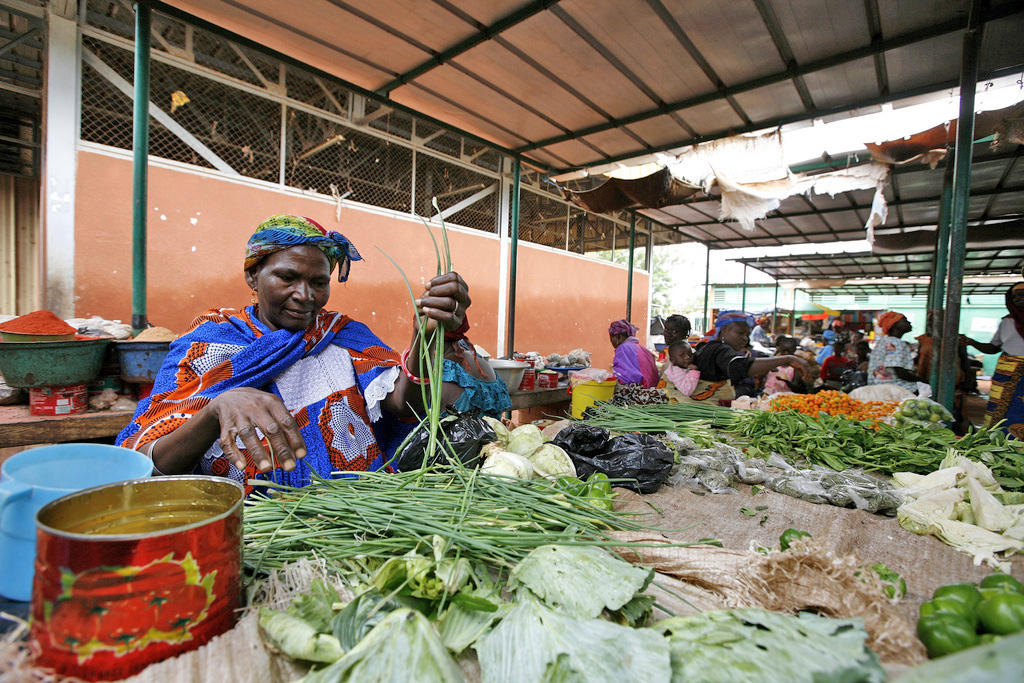Supporting the cattle market as rural hub

Swiss development and cooperation work in Burkina Faso shows how important personal responsibility on the part of the local people is. It is not enough to measure success with figures alone, the voice of the people is just as important.
“After a period of expert advice we quickly came to the conclusion that we need to allow the local population to take their development goals into their own hands,” Philippe Fayet of the Swiss Agency for Development and Cooperation (SDC) told swissinfo.ch.
The coordinator of the SDC cooperation office in Burkina Faso’s capital city Ouagadougou cites the example of the town of Fada N’Gourma to illustrate the efforts for development of medium-sized towns in the countryside.
In Fada the livestock market has developed into an economic hub. “Every week hundreds of animal traders and other traders meet here. The Swiss-financed development project has an impact which extends far beyond the local context. The market is significantly contributing to the development of the whole region,” Fayet said.
“Success”
The trading infrastructure provided by the community of Fada N’Gourma, with Swiss support, which includes a central market, an animal market and a bus station, appears to have been a success. “I don’t trust the word success,” Fayet said. “To set up a market and make it work is not as important as the question what will the population make of it in the future.”
The decisive thing, according to Fayet, is what other people will develop out of this idea to solve their own problems – building slaughter houses, bus stations, product processing, for example.
“This independent choice of activities by the people is important. And we have to support it. In this sense our activity at the moment is successful. Our commitment has to advance such success,” said Fayet, who attended a recent development aid conference in Bern.
Personal responsibility
Joséphine Ouedraogo, sociologist, ex-minister in Burkina Faso and former general secretary of the non-governmental organisation Enda Tiers Monde, accompanied SDC’s rural development work at a time when the farmers’ movement was emerging. “There was an SDC rural development study that promoted discussion among farmers and encouraged them to take personal responsibility. Through this the farmers made an important step forwards,“ she told swissinfo.ch.
“The personal responsibility acquired by the local actors can be seen now in places like the market at Fada: the activities of the local authorities, the business people, the animal traders, the banks, the local committees. That’s where the success of this movement is visible.”
In any case a useful infrastructure has now been put in place, Ouedraogo said. “Infrastructure that mobilises even traditional circles like the livestock traders. And at this livestock market in Fada there are lots of other activities and exchange possibilities, including dealers from neighbouring countries.”
The earnings from this market allow the authorities to invest in other sectors, she added.
Democracy building
Does this mean Burkina Faso is on the right path for the future? “I wouldn’t put it like that,” Ouedraogo answered. “We have a market economy that first has to be developed, the same goes for the farmers’ movement. We have another long way to go towards the building of a democracy, it is a very long process.”
What is happening now is “that the population, with or without development aid, has become aware that they can demand the local authorities or the state to deliver on their promises”.
Ouedraogo gives an example. In a rural village the schoolchildren – not their parents – staged a sit-in demanding the removal of an unpopular and violent teacher. The authorities had to get rid of him and find a replacement. “That happened without the help of a development organisation,” Ouedraogo laughed. This sense of personal responsibility, this self-confidence – that is an important means on the way to a law-based state.
Solution culture
There will always be mistakes in projects, Fayet believes. “We have a bus station in Fada N’Gourma that works badly, because of negotiations with the unions. The problem wasn’t created by SDC but by the local authorities because they played it down.”
What’s important is that there is a solution culture. “How can one overcome these difficulties? I believe such problems also happen in Switzerland. The question is the same everywhere: How can we solve such difficulties?”
Local voice
It is clear to Fayet that the effectiveness of development aid cannot be measured with figures alone. What really counts is listening to the voice of the local people.
SDC will remain active in Burkina Faso until 2016. And then? “The foreign aid organisations have to leave. Otherwise we always feel under their patronage, not confident, needing help,” Ouedraogo said.
“I’m not saying we don’t need help from outside but it must be a different kind of help. Countries like Burkina Faso have to be capable to move forward with their own resources. We have to choose our own partners tell them what we need. Maybe it will then be SDC again …”
The FONAENF is one of the SDC’s key support programmes in the area of basic education in Burkina Faso.
The fund was set up by the SDC with help from the Burkina government and other partners to encourage literacy.
The objective of the fund is to encourage greater access to non-formal education and improve literacy training. Participants can also take courses to test their skills.
Since 2002 some 500,000 people – 60 per cent women – have benefited from the literacy fund.
(Translated from German by Clare O’Dea)

In compliance with the JTI standards
More: SWI swissinfo.ch certified by the Journalism Trust Initiative










You can find an overview of ongoing debates with our journalists here . Please join us!
If you want to start a conversation about a topic raised in this article or want to report factual errors, email us at english@swissinfo.ch.